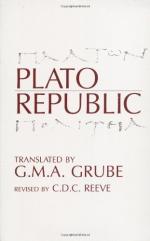|
This section contains 822 words (approx. 3 pages at 300 words per page) |

|
Plato: Divine Commands Can Never be Genuinely Moral Commands
Summary: Answers the question of why Plato argues that divine commands can never be genuinely moral commands. Discusses the divine nature of God and whether morality exists independently of God.
From the Euthyphro dilemma, Plato argues that divine commands can never be genuinely moral. The divine commands are those belonging or coming from God. This argument stems from the idea that because God is omnipotent, omniscient that he will punish us when he detects any failures. Thus suggesting that the fear that motivates us to follow such divine commands is not a suitable motive to a certain moral action. Another argument that Plato presents is that God sets such divine commands because they are moral which raises the idea that morality exists as an entity separate to God. Both these ideas suggest that the divine command is not genuinely moral as they are acted upon in the interest of the individual and questions the motives of moral actions.
In Plato's argument, he addressees the motives of our moral actions. Since God is omnipotent, omniscient, and omni benevolent he...
|
This section contains 822 words (approx. 3 pages at 300 words per page) |

|


